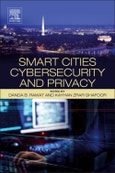Smart cities improve the quality of life of citizens in their energy and water usage, healthcare, environmental impact, transportation needs, and many other critical city services. Recent advances in hardware and software, have fueled the rapid growth and deployment of ubiquitous connectivity between a city's physical and cyber components. This connectivity however also opens up many security vulnerabilities that must be mitigated.
Smart Cities Cybersecurity and Privacy helps researchers, engineers, and city planners develop adaptive, robust, scalable, and reliable security and privacy smart city applications that can mitigate the negative implications associated with cyber-attacks and potential privacy invasion. It provides insights into networking and security architectures, designs, and models for the secure operation of smart city applications.
Please Note: This is an On Demand product, delivery may take up to 11 working days after payment has been received.
Table of Contents
1. New Era of Smart cities, from the prospective of Internet of Things 2. Community-Based Security for the Internet of Things 3. Blockchain Based Security & Privacy in Smart Cities 4. Privacy-aware Physical Layer Security Techniques for Smart Cities 5. Crowdsensing and privacy in smart city applications 6. Privacy Preservation in Smart City 7. Privacy and Security Aspects of E-government in Smart Cities 8. Big Data enabled Cybersecurity for Smart City Applications 9. Free Public Wi-Fi Security in a Smart City Context an End User Perspective 10. Techniques for privacy preserving data publication in the cloud 11. Security in Smart Cyber-Physical Systems: A Case Study on Smart Grids and Smart Cars 12. Priority-based and Privacy-preserving Electric Vehicle Dynamic Charging System with Divisible E-Payment 13. Secure IoT Structural design for Smart Homes 14. Outlier Discrimination and Correction in Intelligent Transportation Systems 15. Secure Data Dissemination for Smart Transportation System 16. Connected Cars: Automotive Cybersecurity and Privacy for Smart Cities 17. Fraud Detection Model based on Multi-Verse Features Extraction Approach for Smart City Applications 18. Privacy Preserving Date Utility Mining Architecture 19. Smart Megaprojects in Smart Cities, Dimensions, and Challenges








